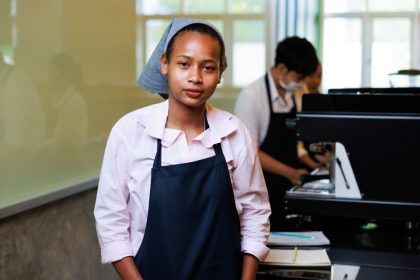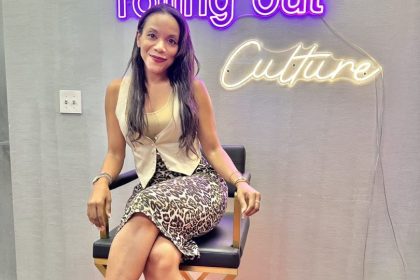Kirabo Jackson, a labor economist who studies education and social policy issues, is the Abraham Harris Professor of Human Development and Social Policy at Northwestern University.
Jackson, who was appointed to the White House Council of Economic Advisors in August 2023, has analyzed several important aspects of education policy, including the importance of public-school funding on student outcomes through adulthood, the effects of college-preparatory programs on students’ college and labor market outcomes, the effects of educational tracking on students’ academic achievement, and how single-sex education can impact students’ academic performance.
He earned his bachelor’s degree in ethics, politics, and economics from Yale University in 1998 and his doctorate in economics from Harvard University in 2007. He was assistant professor in the department of labor economics at Cornell University between 2007 and 2010 and then moved to Northwestern where he subsequently earned tenure in 2012. He was promoted to full professor in 2017.
Munson Steed: Hey, ladies and gentlemen, this is Munson Steed. We are at A Seat at the Table, where we discuss and bring decision makers, key influencers, subject matter experts on where and how we can secure our seat at the table, inside our economy, inside our health protocol, in our intellectual educational performance as a community. I am so proud of this current young man, Dr. Jackson, how are you? And welcome to A Seat at the Table.
Dr. Kirabo Jackson: I’m doing very well. Thank you for that introduction.
MS: You’re very welcome. When we think about it, the very landscape of economics, and how our President is making a true effort to give access and relief to so many in our community. Can you give us a 3-minute on where he is providing that, so that people can have these message points to share.
Trying to make sure all Americans benefit
KJ: Absolutely, thank you for that question. So, broadly speaking, President Biden and Vice President Harris, we believe in making sure that [we maintain] the overall gains that we’re seeing in the economy. We’ve had very strong GDP growth since 2019, faster than our allies, our friends over across the ocean in Europe. We’ve added about 17 million additional jobs since this president took office. We’ve had unemployment below 4% for 27 consecutive months, something we haven’t seen in over 50 years. So, it’s really important that these overall positive things that we’re seeing in the economy are really benefiting and felt by all.
So, one of the things the administration has really done is really make sure that all Americans benefit. So, I can highlight a few key things that have happened under this administration, also a few things that are specific policies aimed to make sure that everyone eases a pain for everyone. So, one example would be making sure that the price of medicine is lower for all Americans. This administration has got an organization to start negotiating with drug companies to bring the prices of medicine down, insulin in particular, for those who have to take that is now kept at $35.
When you go and you have to pay $35, that’s basically something that President Biden and Vice President Kamala Harris have done. In addition, there’s the save plan. You’ve probably seen a lot of people in the news being really excited about the fact that they got their student loans forgiven. So, there’s been student-debt forgiveness. A lot of Americans, unfortunately, took out loans several years ago, and due to sort of the growing balloon payments due to the interest payments have been unable to get out from under large amounts of student debt.
This president has decided to relieve many Americans of that debt and also done it for many Americans who’ve done a lot of public service. For example, about 900,000 Americans took out student loans and served their communities as teachers, as doctors, as nurses, as social workers. They had their student loans forgiven, giving them just a little bit more breathing room to focus on the things that really matter. Moving forward to give some relief to Americans in the face of just growing tuition prices, which is something that has happened from before this president took office.
The president introduced a save plan, which is an income-driven repayment plan that says that if you take out federal student loans, your payments are based on how much you earn, not based on the overall amount of your income. So that means, if you happen to fall on hard times, you’re not going to be saddled with a $600 payment per month. If you fall on hard times, your income happens to be below, say $30,000. You may have a 0 payment. And after 20 years, if you’re in good standing, and you’ve made all your necessary payments, which could be $0 by the way, you have your outstanding loan balance forgiven.
It’s giving just a lot more breathing room for Americans in general, and I can go on. They’re also making sure Americans have access to high-speed Internet access to the connectivity program. This has saved billions of dollars for Americans bringing down how much they pay for Internet connection, also, expanding Internet connectivity across all communities to make sure that those who are remote areas have access to these things, because, as you recall, during the pandemic, some people had to go to school on the Internet.
So, they make sure to access high-quality broadband that is affordable for all. So, there’s a variety of ways in which this administration is really focused on bringing down costs. I also want to just mention that a lot of the investments that are being done onto this administration through the bipartisan infrastructure law, the Investment Reduction Act. A lot of those are targeted towards communities that have had low levels of employment for a while and also a large chunk of them are communities of color, to really make sure that when the government is investing money, all Americans benefit.
How to navigate the economy?
MS: How would you say we need to look at our economic future as an economist and a Black man? I know the Biden Administration; we got him straight. But just how can our community look at this economy and understand how to navigate it, labor, future vision, savings?
KJ: That’s an excellent question. So, the first thing I want to do is just to talk a little bit about inflation, and why it hurts. Now, of course, if prices go up, that’s something that no one really likes, because it means that if our wages don’t go up, then that really is painful. Our purchasing power, our quality of life, is going down. So when you have a productive economy that is raising the quality of life for all Americans. What you have is, you have inflation that is low but you have wage growth which is faster than inflation. So, typically what we like to see is inflation around 2 or 3% and wage growth somewhere around 3 or 4%. So every year people are able to buy a little bit more with their paycheck.
Now, unfortunately, when we had the supply chain issues that happened, we had the war with Russia, a lot of things happened during COVID. We had a sudden spike in inflation, so prices went up very rapidly, and our wages were not able to keep up, and that’s when the pain hit. What you have to do to sort of deal with this is, you need to grow wages faster than inflation to sort of catch up, and that’s essentially what we’ve had under this administration. So, we brought inflation down which, not to say prices aren’t going up, but they’re going up at a moderate pace.
And we’ve basically grown wages, so that our purchasing power is actually better than it was before. And actually, if you look over time, on average, each average wage is higher than they were pre-pandemic. And this is true for most groups. This is true for African Americans in general, and this is true for most groups. So, the key thing I would always focus people on, is make sure that you’re getting the raise, and that your raise is higher than prices, and that we’ve seen most Americans have had that.
The second thing I want to highlight is that this is a good time to go and get a job and try to do what we call an occupational upgrade. We’ve had unemployment below 4% for 27 consecutive months, which is something which we haven’t seen for a long period of time. And we’ve also seen many communities doing what we call occupational operating. We’ve seen this for Black Americans in particular, where they’re less likely to be in sort of lower wage occupations and more likely to be in managerial positions.
Now is a good time to make that transition, because when you have a tight labor market like this, firms are looking for employees. So, it’s a good time to look for a job. Get that raise, outpace inflation and that’s one thing I sort of recommend people do.
MS: Last question, for those young people who are looking to figure out what you mean by an upgrade. If we, and I challenge many people at A Seat at the Table, to just give them and some insight to 3 to 5 industries that you would suggest they begin to upgrade to.
KJ: Well, one of the things that we’re seeing, and I’ll tie this back to where Vice President Harris is right now, is really talking about the transition towards clean energy. We’re sort of talking about the fact that as we transition away from combustible fuels. The car that takes gas and we move towards cars that are going to be used will be electric. We have to change the way that we produce cars. So, we’re moving away from dirty technology towards clean technology, which is both good for the environment, but also good for employers and offer for jobs.
As long as we can keep those jobs here in the United States, and that’s exactly what this is about. So, this would be a good time to get a job. Say, for example, in terms of installing solar panels, if you’re sort of in the manual trades. If you’re also in the sector towards transition towards EVs. This would be a good time towards battery technology. Those are all areas of growth. We’ve seen a rapid growth in investments in terms of chips manufacturing as well in this country, all towards this sort of transition towards a cleaner economy. So those are growth industries.
This administration is invested in those industries to make sure we have a clean economy, and I think those are going to be industries of growth, and we recommend everyone do that. I’ll also add that a lot of the money that is being spent right now is to also provide rescaling and retraining, to make sure that these industries have the workforces that are able to take advantage of these jobs. So, for anyone who’s looking for a new sector, a new job, wants to be in an area of growth, this is a good time to take advantage of some of these reskilling opportunities. Some of these registered apprenticeships, and take advantage of that and essentially upskill, get a raise and make sure your raise is going faster than prices are.
MS: Great. Well, this is Munson Steed, and I have had the pleasure of being with our phenomenal economist, Dr. Jackson. Thanks so much. We appreciate you coming to A Seat at the Table.
KJ: Thank you so much for having me.

















